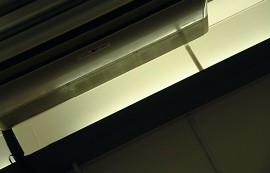Whether you suffer from an allergy or are simply concerned about your health, you are likely to understand the importance of good air quality. While you can check the local news reports for outdoor air quality reports, you may find that your home’s indoor air quality is actually more potentially harmful. Fortunately, here are five simple ways you can easily improve your air quality. 
Get Rid of the Chemicals:
You may be unaware that many herbicide and insecticide products are derived from nerve gases developed for wartime attacks. Many of these products use organophosphates, which research has shown may increase your risk of developing cancer or have reproductive difficulties. These chemicals are continually emitting gas even when they are sitting around in your kitchen cabinets or garage. You will need to take care to dispose of these products responsibly, and they should never simply be dumped down the drain. Many city authorities consider these products to be hazardous waste, which means that you may need special instructions of how they should be treated.
Don’t Run Your Car:
Many people like to warm up their car in winter or end up sat waiting for a family member in the garage. Even if the garage door is open, some of these potentially toxic exhaust fumes will end up inside the house. It is a far better idea to pull the car out onto the driveway and shut the garage door. An even better idea is to think green and avoid running your car when you don’t need it; save gas by riding a bike, carpooling or upgrading your vehicle. This will help you to save the environment and improve the air quality indoors and outside.
Seal Holes and Cracks:
Air moves through even small spaces, so you will need to check the wall that connects your home to your garage for signs of holes or cracks. Pay close attention to corners, where cracks are more likely to occur. You will need to ensure that even small cracks are sealed with caulk.
Check Your Heating Unit:
If your furnace is in your garage, then it could be creating an elevated level of pollutants inside your home. When your furnace starts up, it uses the air in the surrounding area. In the case of garages, this could contain gasses from pesticides, oil, paint and any number of other chemicals.
You may wish to consider relocating your furnace to a different area of the home such as in your basement or a utility closet. Unfortunately, this is likely to be quite costly, but you will need to consider the impact it will have on your air quality. A cheaper option is to use a high quality filter to eliminate any chemical traces from the system.
Dispose of Leftover Paint:
Most homeowners have lots of partial cans of paint sitting around in the garage. These are kept handy for touch ups, but before you know it you can accumulate dozens of cans you will never use. These cans will be emitting potentially toxic gasses into your indoor air. If you can’t dispose of your leftover paint, you can mitigate this by sealing the can with plastic wrap before you hammer on the metal lid. This will help to more adequately seal the can and keep fumes trapped inside. If you are certain you won’t use the paint, you can either donate it to someone or dispose of it safely.
